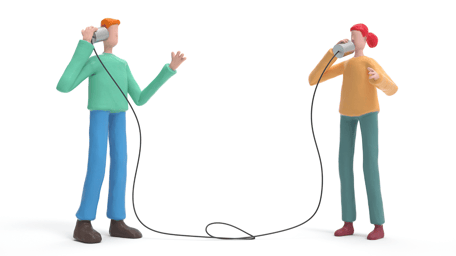What is Communication Skills Training and Why Do I Need It?
Communication skills training is a type of training that is designed to help individuals improve their ability to communicate effectively with others. This type of training can cover a wide range of soft skills, including verbal and nonverbal communication, active listening, conflict resolution, public speaking, and more.

Effective communication is an important skill in many different settings, whether it be in business, personal relationships, or the workplace. By improving communication skills, individuals can more effectively express their thoughts, ideas, and needs. They can also better understand and interpret the messages of others, which can lead to more positive interactions and relationships.
Download our FREE eBook:
Top 5 Skills to Include in Soft Skills Training
There are many reasons why someone might want to take communication skills training or soft skills training. Some reasons include:
- To improve relationships with colleagues, family members, and friends
-
To become more effective in a leadership role
-
To reduce misunderstandings and conflicts in the workplace
-
To improve public speaking and presentation skills
-
To build credibility and become more influential
-
To increase confidence and self-esteem
Soft Skills and Their Importance
How to Make a Good First Impression
Making a good first impression is crucial for both personal and professional interactions. Soft skills training can be a great way to improve your ability to make a positive impression on others. One important aspect of making a good first impression is to be confident and approachable. This can be achieved by maintaining good posture, making eye contact, and smiling. Another important aspect is to be well-prepared and well-informed about the situation or person you will be interacting with. This can be accomplished by researching the person or organization beforehand and practicing what you want to say.
Additionally, it's also important to be an active listener, show genuine interest and engage in the conversation. Nonverbal cues such as nodding, maintaining good eye contact, and asking thoughtful questions are all ways to demonstrate active listening. Lastly, it's also important to be professional, courteous, and respectful. Remember to be on time, dress appropriately, and use appropriate language.
How to Negotiate
Negotiating is an essential soft skill to have in both personal and professional contexts. It involves the process of communicating with others to reach an agreement or compromise. To effectively negotiate, it's important to be prepared, have a clear understanding of what you want, and be able to effectively communicate your needs and interests. Additionally, it's also important to be able to listen actively, understand the other party's perspective, and be willing to compromise.
One key aspect of negotiation is to be able to identify and express your "BATNA" (Best Alternative to a Negotiated Agreement). Knowing your BATNA means knowing what the best outcome is that you can get if the negotiations fall through and what is the worst, this way you can measure the value of the proposal.
How to Read Facial Expressions
Reading facial expressions is an important soft skill to have, as it allows you to understand the emotions and intentions of the people you are communicating with. This skill can be especially valuable in personal and professional contexts, as it can help you to build better relationships, resolve conflicts, and even close deals.
To effectively read facial expressions, it's important to pay attention to both the verbal and nonverbal cues that people are giving off. This includes not only the obvious cues such as a smile or a frown, but also more subtle cues such as changes in eye contact, tone of voice, and body language.
Why Do I Need To Be Trained To Acquire Soft Skills?
Acquiring soft skills is an essential part of personal and professional development. These skills are not only beneficial for individuals, but also for organizations and businesses, as they play a key role in effective communication, teamwork, and leadership.
Soft skills such as effective communication, problem-solving, time management, and leadership are critical for success in any field. Without these skills, it can be challenging to establish and maintain positive relationships, meet goals and deadlines, and navigate complex situations. Additionally, in the modern business environment, the ability to work well with others and adapt to change is increasingly important for success, and these are both areas where soft skills play a crucial role.
Soft skills training is a valuable consideration for any business because it helps employees develop the interpersonal abilities that are essential for effective communication, teamwork, and leadership. These skills are critical for success in any workplace, as they enable employees to work well with others, build strong relationships with customers and colleagues, and effectively manage and resolve conflicts. Additionally, soft skills training can help employees to improve their time management, problem-solving, and decision-making abilities, which can lead to increased productivity and efficiency.
Furthermore, Soft skills such as adaptability, creativity, and emotional intelligence are becoming increasingly important for businesses to survive in an ever-changing and competitive market. Investing in the soft skills development of employees can also benefit companies with improved employee engagement and retention, leading to a more positive and productive work culture overall.
If you found this blog helpful and want to learn more,
be sure to download our FREE eBook:
Top 5 Skills to Include in Soft Skills Training


